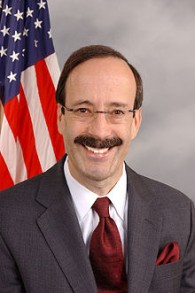Jewish Democrats Schumer and Engel will oppose Iran deal
By TIMES OF ISRAEL STAFF AND AP
“Chuck Schumer: Inspections terms are ‘troubling,’ and snap-back sanctions ‘cumbersome’; Eliot Engel unconvinced accord blocks Iran from bomb”
Two top Jewish Democrats overnight Thursday-Friday announced they will oppose the Iran nuclear deal in a September vote in Congress, in a blow to US President Barack Obama’s efforts to garner support for the accord reached between world powers and Iran on July 14.
New York Senator Chuck Schumer said in a statement that “after deep study, careful thought and  considerable soul-searching, I have decided I must oppose the agreement and will vote yes on a motion of disapproval.”
considerable soul-searching, I have decided I must oppose the agreement and will vote yes on a motion of disapproval.”
Schumer said he would make an effort to persuade his fellow lawmakers to oppose the deal, while praising Obama’s diplomacy. According to The New York Times, the senator had studied the deal carefully prior to the announcement, and had met with Obama, negotiator Wendy Sherman, and former US secretary of state Henry Kissinger to discuss its merits.
“While I will certainly share my view and try to persuade them that the vote to disapprove is the right one, in my experience with matters of conscience and great consequence like this, each member ultimately comes to their own conclusion,” he said.
In his explanation, Schumer said he found the restrictions on inspections of Iranian facilities — which could take up to 24 days — to be “troubling,” and the promised snap-back sanctions mechanism “cumbersome and difficult to use.”
“Even more troubling is the fact that the US cannot demand inspections unilaterally… It is reasonable to fear that, once the Europeans become entangled in lucrative economic relations with Iran, they may well be inclined not to rock the boat by voting to allow inspections,” Schumer maintained.
The senator said Iran’s ongoing support for terror is what gave him “the most pause.”
“To me, the very real risk that Iran will not moderate and will, instead, use the agreement to pursue its nefarious goals is too great,” Schumer said. “Therefore, I will vote to disapprove the agreement, not because I believe war is a viable or desirable option, nor to challenge the path of diplomacy. It is because I believe Iran will not change, and under this agreement it will be able to achieve its dual goals of eliminating sanctions while ultimately retaining its nuclear and non-nuclear power.”
Meanwhile, Rep. Eliot Engel, the most senior Democrat on the US House of Representatives Foreign Affairs Committee, announced on Thursday he would oppose the accord.
“The answers I’ve received simply don’t convince me that this deal will keep a nuclear weapon out of Iran’s hands, and may in fact strengthen Iran’s position as a destabilizing and destructive influence across the Middle East,” Engel said, according to Reuters.
House Minority Leader Nancy Pelosi responded by saying that “anybody whipping has never put Schumer in the ‘yes’ column. But the calculation still is we’ll have the votes” even without him, according to the New York Times.
Lawmakers are required to vote on whether to accept the Iran agreement by September 17. Opposition is overwhelming from Republicans arguing that the US gave away too much in negotiations and from many Democrats sympathetic to Israel, which considers the pact a disaster.
It’s nearly certain that the GOP-controlled Congress will reject the deal, and that Obama will veto that bill. That means the suspense is over whether Obama can corral enough Democratic support to sustain his veto and keep the agreement alive.
As the White House continued trying to win votes for the deal, three more House Democrats announced support for the agreement: Reps. Gerry Connolly of Virginia, Joe Courtney of Connecticut and Donald Payne Jr. of New Jersey.
So did two additional Democratic senators: Jeanne Shaheen of New Hampshire and Kirsten Gillibrand of New York.
Sen. Ben Cardin, D-Md., said he’d discussed the deal with Obama at the White House Wednesday night. Cardin, who has not said whether he will support the agreement, said he is considering “whether it will put us on a path to make it less likely or more likely that Iran becomes a nuclear weapons state.”
When Congress returns after Labor Day, lawmakers will face a fall packed with do-or-die deadlines, including a September abbreviated by the Jewish holidays to just 10 days when both chambers are simultaneously in session.

